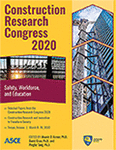Construction Research Congress 2020
Awareness Regarding Risks of Drugs and Substance Abuse among Construction Workers
Publication: Construction Research Congress 2020: Safety, Workforce, and Education
ABSTRACT
The use of drugs and other intoxicating substances has always been a widespread issue in the construction industry leading to the loss in productivity, cost over-runs, legal issues, and absenteeism, in addition to fatal accidents and deaths. In particular, laborers working under the influence of intoxicating substances are also harmful to the construction business in terms of possible economic losses caused by an accident. The current systems of mitigation like written policies, awareness programs, and drug testing prevalent in the industry may curb the problem to a certain extent but they too have their limitations and drawbacks. This study conducted a survey of industry experts (academicians closely associated with the industry) and professionals to examine: 1) the major impacts of substance abuse in the construction industry, 2) the awareness of industry professionals regarding the issue, and 3) the feasibility and efficiency of the current practices in its mitigation. The objective of the study was to explore the three above mentioned areas through the survey, and to verify whether the findings are in support of the facts obtained from the literature study of previous research in this area. It was concluded in this study that there is a considerable gap in the level of awareness regarding drug risk among construction professionals working at various positions. In addition, the present systems adopted by the industry, as mentioned above, to put a check on substance abuse are not adequate and a more versatile method is required.
Get full access to this article
View all available purchase options and get full access to this chapter.
REFERENCES
ASSP (2018), American Society of Safety Professionals. “National Crisis: Opioid Abuse in the Construction Industry.” (Aug. 28, 2018)
Bell, D. (2018), “6 ways drug use hurts the construction industry.” USA Mobile Drug Testing, (May 7, 2018).
Buddy, T. (2018), “The dangers of substance abuse in the workplace”. <www.verywellmind.com> (Oct. 26, 2018).
Cook, R. F., Hersch, R. K., Back, A. S., and McPherson, T. L. (2004), “The prevention of substance abuse among construction workers: a field test of a social-cognitive program.” The Journal of Primary Prevention, Vol.25, No. 3, (Nov. 2004).
Elkins, C. (2018), “Construction workers and addiction.” Drug Rehab. <https://www.drugrehab.com/addiction/construction-workers/>; (May 15, 2018)
Hanna, A. S., Taylor, C. S., and Sullivan, K. T. (2005), “Impact of extended overtime on construction labor productivity.” Journal of Construction Engineering and Management. Vol. 131 (6).
Gerber, J. K. and Yacoubian, G. S. (2002) “An assessment of drug testing within the construction industry” J. Drug Education. Vol. 32(1) 53-68, 2002.
Jones, K. (2016), “Construction leads all industries in total worker deaths.” Construct Connect. <https://www.constructconnect.com/blog/construction-leads-industries-worker-deaths>; (Dec. 20, 2016)
Minchin, R. E., Glagola, C. R., Guo, K., and Languell, J. L. (2006), “Case for drug testing of construction workers.” American Society of Civil Engineers (ASCE), 22(1): 43-50.
Mushi, F. V., and Manege, S. L. (2018), “Alcohol abuse and illicit drug use at construction sites: perception of workers at construction sites.” International Journal of Construction Engineering and Management, 7(2): 65-72.
NCADD (2015), National Council of Alcoholism and Drug Dependence. <www.ncadd.org> (Apr. 26, 2015).
NCSL (2019), National Conference of State Legislatures. “State Medical Marijuana Laws.” <http://www.ncsl.org/research/health/state-medical-marijuana-laws.aspx> (July 2, 2019).
Newton, M. (2017), “The legalization of marijuana and its impact on the construction industry.” Roofing Contractor – The Official Publication of the International Roofing Expo, (Sept. 28, 2017).
NIDA (2018). National Institute on Drug Abuse. “Most commonly used addictive drugs.” <https://www.drugabuse.gov/publications/media-guide/most-commonly-used-addictive-drugs>; (July, 2018).
OSHA (1998), Occupational Safety & Health Administration. <http://www.osha-slc.gov/OshDoc>
Russell, J. (2017), “Industry news: how is the construction industry affected by drug abuse.” Confirm Bioscience. <https://www.confirmbiosciences.com/knowledge/blog/industry-news-construction-industry-affected-drug-abuse/> (Apr. 11, 2017)
SAMHSA (2018), Substance Abuse and Mental Health Services Administration, U.S. Department of Health Services Administration, <www.samhsa.gov> (Dec. 14, 2018)
Smith, S. (2014), “Risks, the facts and the repercussion.” EHS Today, (Dec. 03, 2014).
Tennant, F. (1988), “The rapid eye test to detect drug abuse.” Journal of Postgraduate Medicine, Vol. 84 (1).
Wang, T. (2019), “Value added of the construction industry as a share of gross domestic product in the U.S. from 2007 to 2018.” Statista, <https://www.statista.com/statistics/192049/value-added-by-us-construction-as-a-percentage-of-gdp-since-2007/<; (Aug. 9, 2019).
Whirlwind Team, “Drug and alcohol policy in the construction industry.” Whirlwind Steel Buildings and Components. <https://www.whirlwindsteel.com/blog/drug-and-alcohol-policies-in-the-construction-industry<; (June 22, 2016).
Zitzman, L. (2019), “25 construction safety statistics and trends for 2019.” Big Rentz. <https://www.bigrentz.com/blog/construction-safety-statistics<; (May 14, 2019)
Information & Authors
Information
Published In
Construction Research Congress 2020: Safety, Workforce, and Education
Pages: 538 - 546
Editors: Mounir El Asmar, Ph.D., Arizona State University, David Grau, Ph.D., Arizona State University, and Pingbo Tang, Ph.D., Arizona State University
ISBN (Online): 978-0-7844-8287-2
Copyright
© 2020 American Society of Civil Engineers.
History
Published online: Nov 9, 2020
Authors
Metrics & Citations
Metrics
Citations
Download citation
If you have the appropriate software installed, you can download article citation data to the citation manager of your choice. Simply select your manager software from the list below and click Download.
